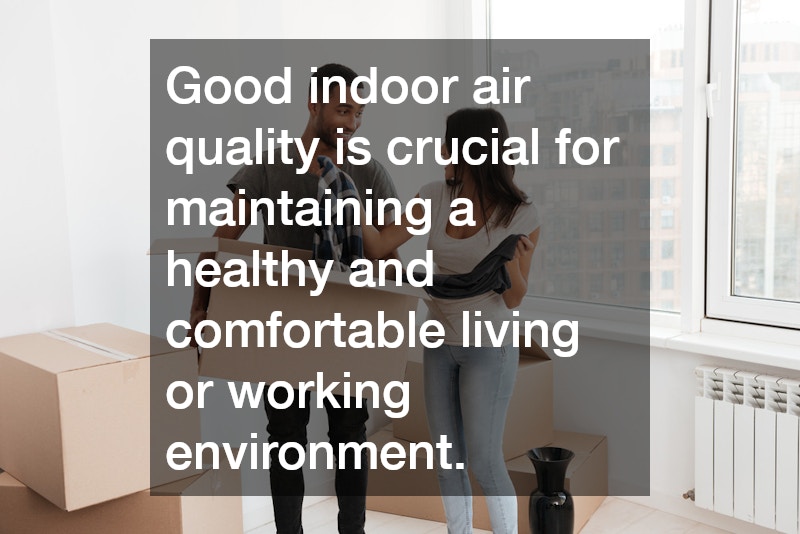
The air we breathe inside our homes, offices, and other buildings has a significant impact on our health and well-being. While we often focus on outdoor air pollution, indoor air quality is equally important, as we spend the majority of our time indoors. Poor indoor air quality can lead to a range of health issues, from minor irritations to serious respiratory conditions. Fortunately, indoor air quality services can help ensure that the air in your home or workplace is clean, safe, and conducive to good health.
In this blog, we’ll explore why indoor air quality matters, the risks of poor air quality, and how indoor air quality services can help create a healthier living and working environment.
1. Why Indoor Air Quality Matters
Good indoor air quality is essential for maintaining a healthy indoor environment. The air we breathe indoors can be contaminated with pollutants such as dust, allergens, mold, volatile organic compounds (VOCs), and other harmful particles. These pollutants can accumulate over time, especially in buildings that are not well-ventilated or maintained.
Indoor air quality is particularly important for vulnerable individuals such as children, the elderly, and those with pre-existing health conditions like asthma or allergies. Breathing in clean, fresh air can help reduce the risk of respiratory issues and improve overall well-being. Moreover, good indoor air quality promotes comfort, productivity, and mental clarity, making it important in both homes and workplaces.
2. The Risks of Poor Indoor Air Quality
Poor indoor air quality can lead to a variety of health problems, ranging from short-term discomfort to long-term health risks. Some of the most common symptoms associated with poor indoor air quality include:
Respiratory Issues: Contaminants like dust, pollen, mold, and VOCs can irritate the lungs and airways, leading to symptoms such as coughing, wheezing, shortness of breath, and even asthma attacks. Prolonged exposure to these irritants can exacerbate existing respiratory conditions or contribute to the development of new ones.
Allergies: Indoor allergens, such as pet dander, dust mites, and mold spores, can trigger allergic reactions in sensitive individuals. Common symptoms include sneezing, runny nose, itchy eyes, and skin rashes. For people with allergies, improving indoor air quality can make a significant difference in their comfort and quality of life.
Headaches and Fatigue: Poor indoor air quality can contribute to feelings of fatigue, dizziness, headaches, and difficulty concentrating. Exposure to VOCs, which are often released by household products like cleaning agents, paints, and adhesives, can be particularly harmful and may lead to symptoms of “sick building syndrome.”
Long-Term Health Risks: In some cases, long-term exposure to indoor air pollutants can lead to more serious health conditions, including respiratory diseases, cardiovascular issues, and even cancer. This is especially true in environments where there is prolonged exposure to harmful substances like asbestos, radon, or tobacco smoke.
Given these risks, it’s important to address any potential sources of indoor air pollution as soon as possible. Seeking indoor air quality services is a proactive step in preventing health problems and ensuring a safe living or working environment.
3. How Indoor Air Quality Services Can Help
Improving indoor air quality often requires professional assistance, as many pollutants are not easily detectable without specialized equipment. Indoor air quality services provide comprehensive solutions to identify, monitor, and address air quality issues in your home or business. Here’s how these services can make a difference:
Air Quality Testing
One of the key services offered by indoor air quality professionals is air quality testing. These tests can detect the presence of harmful pollutants, allergens, mold, and other contaminants in the air. By identifying the specific pollutants present, technicians can develop a targeted plan to improve air quality.
HVAC Maintenance and Cleaning
Your heating, ventilation, and air conditioning (HVAC) system plays a crucial role in maintaining indoor air quality. Over time, dust, mold, and debris can accumulate in HVAC ducts, spreading contaminants throughout the building. Indoor air quality services often include HVAC inspections, cleaning, and maintenance to ensure that your system is working efficiently and not contributing to poor air quality.
Air Purification Systems
Indoor air quality professionals can also recommend and install air purification systems to remove contaminants from the air. These systems can include high-efficiency particulate air (HEPA) filters, UV lights, and ionization technologies designed to eliminate airborne particles, bacteria, and viruses. Installing an air purifier is an effective way to continuously improve indoor air quality and reduce the presence of harmful pollutants.
Humidity Control
Maintaining proper humidity levels is essential for good indoor air quality. High humidity can promote the growth of mold and mildew, while low humidity can cause dry skin and respiratory irritation. Indoor air quality services can assess your home’s humidity levels and recommend solutions like dehumidifiers or humidifiers to maintain a healthy balance.
Mold Remediation
Mold is a common indoor air quality issue that can cause significant health problems if left untreated. Indoor air quality services often include mold inspection and remediation to eliminate mold growth and prevent it from returning.
4. Conclusion
Good indoor air quality is crucial for maintaining a healthy and comfortable living or working environment. The risks associated with poor indoor air quality, such as respiratory problems, allergies, and long-term health issues, highlight the importance of proactive measures to ensure clean air. By working with indoor air quality services, you can identify and address air quality issues, improve ventilation, and create a safer space for you and your family or colleagues.
Investing in indoor air quality services is not just about comfort—it’s about safeguarding your health and well-being for the long term. Whether you’re at home or at work, breathing clean, fresh air is essential to living a healthier, happier life.




